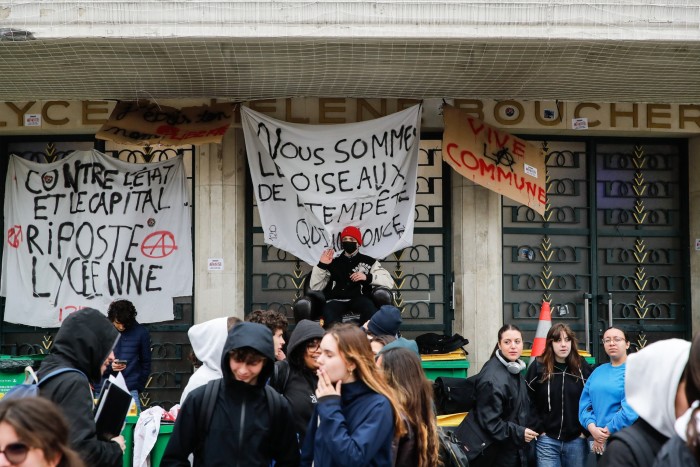[ad_1]
Smaller crowds turned out across France in the tenth nationwide protest held by labour unions against President Emmanuel Macron’s unpopular plan to raise the retirement age, while strikes disrupted transportation and shut down the Eiffel Tower and the Louvre.
By late afternoon, the CGT labour union estimated that 450,000 people had turned out in Paris compared with 800,000 at the last union-led demonstration on Thursday, with declines also reported in Marseille, Rennes and Toulouse. Police figures put the nationwide crowds at 740,000 people compared with more than a million last week.
The lower turnout is a boost for Macron’s government, which has rejected union attempts at mediation to ease the crisis and vowed to hold firm to finalise the reform by mid-April once it has been reviewed by the constitutional court. Unions called for another nationwide protest on April 6.
Some protesters were likely deterred from attending marches because of the chaotic scenes at Thursday’s union-led protest, with more radical activists lighting 900 fires in Paris alone and clashing with police. Some 457 arrests were made, prompting criticism by the EU’s top human rights watchdog.
Although opposed by roughly two-thirds of French people, Macron has staked his reformist credentials and his second-term agenda on increasing the minimum retirement age from 62 to 64. His government overruled lawmakers this month by using the 49.3 clause of the constitution to pass the draft law without a vote, triggering a wave of public anger.
The crowds last Thursday were the largest since the protests began and spontaneous night-time protests have broken out in many cities and towns, making it harder for labour unions to control the movement.
Lorélia Fréjo, a 23-year old member of the Collectif Le Poing Levé, a Marxist revolutionary student group, said young people had sought to display their discontent outside of official marches organised by unions, despite a police crackdown.
“We’re being told by the government that millions of people in the streets is not enough, that it’s useless,” she said at Place de la République where Tuesday’s march in Paris began. “So we have to radicalise our action . . . to protest outside of set calendars.”
On Tuesday, some protesters set uncollected rubbish on fire in Paris and in Lyon and Bordeaux small groups clashed with police who responded with tear gas. But overall the situation appeared calmer than on Thursday. The interior ministry deployed 13,000 police officers nationwide, up from 12,000 last time.

Fréjo said seeing police clash with demonstrators and make arrests was frightening, but she expressed determination to continue. “The government wants to try and terrify us but we’re not going to stop.”
Student activists closed down nine university campuses in Paris on Tuesday, according to the UNEF union, and at least 10 in cities including Toulouse and Nice. Outside Tolbiac university in Paris, students piled up electric scooters and waste bins to block entrances and daubed slogans against pensions reform on walls.
Macron has ruled out pulling the reform, arguing that it is necessary to ensure the viability of the pension system in an ageing population. The law, which requires the constitutional court’s approval before it can be enacted, will raise the retirement age by two years and require people to work for 43 years to receive a full pension.

The government is concerned that the presence of young people in demonstrations, paired with the radical activists who the government refers to as “ultra left”, increases the risk of injuries or even deaths. At an unrelated protest on Saturday over an agricultural reservoir, two activists were seriously injured in clashes with police and remain in a critical condition.
Several human rights groups have sounded the alarm about French police tactics. Dunja Mijatović, the Council of Europe’s commissioner for human rights, on Friday said the conditions surrounding the protests were becoming “worrying” and warned against police using “excessive force” or depriving people of their right to protest.
Officials at the Élysée Palace have been reaching out to unions to find ways to ease the crisis. But the government has not accepted their proposal to put the reform “on pause” to allow for calm to return to the streets.
On Tuesday Laurent Berger, leader of the moderate CFDT union, proposed creating a “mediation” process led by neutral parties.
“We should take a month or two to ask a handful of people to mediate,” he said on France Inter radio, in what would be “a gesture to bring back calm”.
Government spokesman Olivier Véran rejected the idea, however. “There is no need for mediation when we can talk directly,” he said.
[ad_2]
Source link

